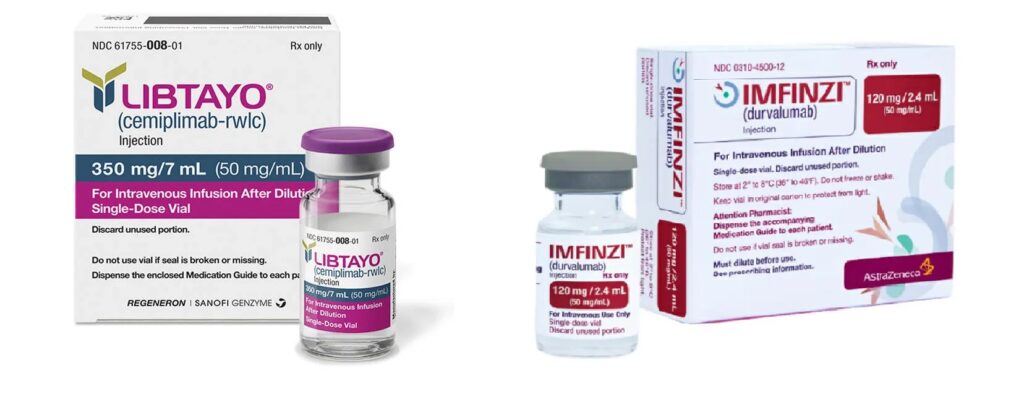November 2022: The combination of tremelimumab (Imjudo, AstraZeneca Pharmaceuticals), durvalumab (Imfinzi, AstraZeneca Pharmaceuticals), and platinum-based chemotherapy was approved by the Food and Drug Administration for adult patients with metastatic non-small cell lung cancer (NSCLC) who lacked sensitising EGFR mutations or anaplastic lymphoma kinase (ALK) genomic tumour aberrations.
POSEIDON (NCT03164616), a randomised (1:1:1), multicenter, active-controlled, open-label study in patients with metastatic NSCLC who had not previously received systemic treatment, assessed the efficacy in these individuals. Tremelimumab, durvalumab, and platinum-based chemotherapy were administered to patients in one of three treatment arms for a total of four cycles, followed by four cycles of durvalumab and maintenance chemotherapy. At week 16, patients received their fifth tremelimumab dosage; (2) durvalumab with platinum-based chemotherapy for four cycles; (3) platinum-based chemotherapy for six cycles; and (4) durvalumab and maintenance chemotherapy.
Treatment was continued until the disease progressed or the side effects became intolerable. Based on a comparison of treatment arms 1 and 3, this approval (675 patients).
Progression-free survival (PFS) as determined by blinded independent central review in accordance with RECIST v1.1 was the primary efficacy outcome measure. include general survival (OS). In comparison to platinum-based chemotherapy, tremelimumab plus durvalumab and platinum-based chemotherapy showed a statistically significant and clinically significant improvement in overall survival (OS) (hazard ratio [HR] of 0.77 [95% CI: 0.65, 0.92], 2-sided p-value = 0.00304); the median OS was 14 months (95% CI: 11.7, 16.1) and 11.7 months (95% CI: 10.5, 13.1) in the treatment arms 1 and 3, respectively The treatment arms’ respective median PFS was 6.2 months (95% CI: 5.0, 6.5) and 4.8 months (95% CI: 4.6, 5.8) (HR: 0.72 [95% CI: 0.60, 0.86], 2-sided p-value = 0.00031).
The overall response rate in treatment arms 1 and 3 was 39% (95% CI: 34, 44) and 24% (95% CI: 20, 29), respectively. In the two treatment arms, the median duration of response was 5.1 months (95% CI: 4.4, 6.0) and 9.5 months (95% CI: 7.2, not reached).
Approximately 20% of participants experienced nausea, fatigue, decreased appetite, musculoskeletal pain, rash, and diarrhoea as side effects. Neutropenia, anaemia, leukopenia, lymphocytopenia, lipase elevation, hyponatremia, and thrombocytopenia were grade 3 or grade 4 laboratory abnormalities ( 10%).
Tremelimumab 75 mg IV every 3 weeks with durvalumab 1500 mg IV and platinum-based chemotherapy for 4 cycles, then durvalumab 1500 mg with maintenance chemotherapy every 4 weeks is the suggested tremelimumab dose for patients weighing 30 kg or greater. At week 16, a fifth tremelimumab dose of 75 mg should be administered.
Using the above dosage schedule, the suggested doses of tremelimumab and durvalumab for patients weighing 30 kg or less are 1 mg/kg and 20 mg/kg, respectively.
View full prescribing information for Imjudo and Imfinzi.


